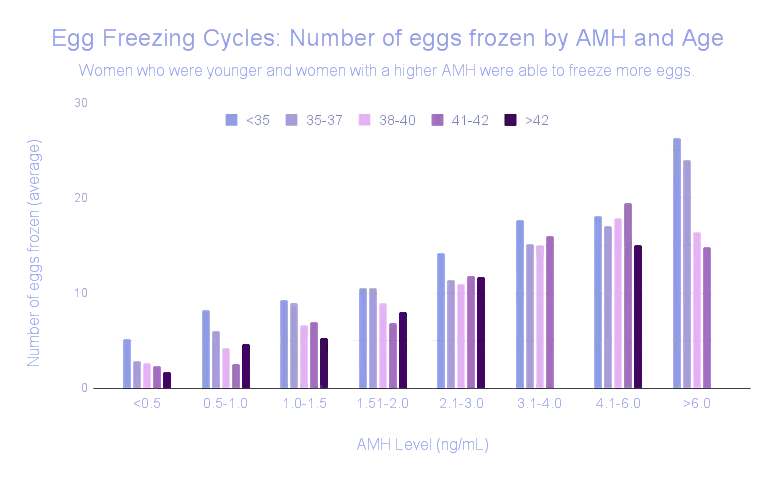Guides
How Low AMH Affects Egg Freezing

What your AMH level means for egg freezing
More and more women are starting to get their fertility tested so that they can better plan for their future.
Maybe you're not interested in having kids now, so you're looking into what your options are, how long you have before you may want to start a family, and whether preserving your fertility now makes sense to help you reach your family goal slater.
It's great information to have. But what if you get your test results back and your doctor says you have low ovarian reserve or diminished ovarian reserve?
What does that mean? Can you still freeze your eggs?
The short answer is yes. You can still freeze your eggs but you might not be able to freeze as many as you'd like from just once egg freezing cycle.
Maybe you're not interested in having kids now, so you're looking into what your options are, how long you have before you may want to start a family, and whether preserving your fertility now makes sense to help you reach your family goal slater.
It's great information to have. But what if you get your test results back and your doctor says you have low ovarian reserve or diminished ovarian reserve?
What does that mean? Can you still freeze your eggs?
The short answer is yes. You can still freeze your eggs but you might not be able to freeze as many as you'd like from just once egg freezing cycle.
Watch: The Egg Freezing Process and Timeline - How Long Does Egg Freezing Take?
A large study out of Extend Fertility, a fertility clinic in New York focused on egg freezing, analyzed the data from over 1,200 women who underwent egg freezing at their clinic to see how many eggs women were able to freeze in a cycle based on their age and their AMH level.
We'll look at this data to answer how AMH affects egg freezing and what this means for your fertility.
What is ovarian reserve?
Ovarian reserve is an estimation of how many eggs you have. Women are born with a set number of eggs, and as you age, your ovarian reserve lowers.
Some women reach a low ovarian reserve faster than what is typical for their age group, so it's always useful to get your fertility tested, even if you're in your late 20's and not looking to start a family yet.
How is ovarian reserve measured?
The two most sensitive tests used to estimate how many eggs a woman has are:
- AMH level
- Antral Follicle Count (AFC)
While some blood hormone tests need to be done at a specific time of the menstrual cycle, measuring your AMH level can be done at any time, which makes it pretty convenient.
AMH stands for Anti-Müllerian hormone and is secreted by the antral follicles in your ovaries.
Each ovarian follicle contains an egg, so by measuring the amount of AMH secreted from these follicles, you can get an idea of how many eggs you have.
AMH is a marker of ovarian reserve - it is used to measure you how many eggs you have.
The antral follicle count is usually performed on Day 2 or 3 of the menstrual cycle and is done by ultrasound. In this case, a reproductive endocrinologist will look at the ultrasound of your ovaries and count how many antral follicles they see on each.
Both of these tests have been found to be equivalent when it comes to measuring how many eggs you have, so whether you're using an at-home kit to measure AMH or going into the clinic for a blood draw or ultrasound, these tests will give you a good ideas of how many eggs you're woking with.
Can You Freeze Your Eggs If You Have a Low AMH?
The main ideas behind egg freezing is to retrieve as many eggs as possible in one cycle and freeze them so that you have the option to use them later in life if you are having difficult conceiving.
A low AMH level is considered to be <1 ng/mL. If you recently found out that you have low ovarian reserve, you might be considering preserving your fertility.
You can still freeze your eggs even with a low ovarian reserve.
A low AMH means that you might not be able to freeze a whole lot of eggs. But that doesn't mean that your eggs won't lead to children down the road.
Does having a low AMH mean you have poor egg quality?
Important point here: low AMH does not mean that you have bad quality eggs.
Age is the important factor when it comes to egg quality. The younger you are when you freeze your eggs, the higher chance that they will lead to healthy embryos and a baby.
As women age, egg quality declines. So if you have low AMH, you may not have a huge amount of eggs but you might still have good quality eggs.
How Does AMH Level Affect Egg Freezing?
Let's look at the research from Dr. Maslow's team at Extend Fertility in New York.
The results were stratified by both age of women when they did their egg freezing cycle and what their AMH level was.
Both age and AMH were important factors affecting the success of the egg freezing cycle.
This study looked at how many eggs a woman would need to freeze in order to give her the highest chance of having a child in the future. In this study, the goal was to freeze enough eggs to attain a 50%, 60%, and 70% chance of a live birth from the frozen eggs.
The older women were, the more eggs they would need to freeze in order to offset the age-related reduction in egg quality.
You can read more about how many eggs you should freeze based on your age here.
Women who had the best results from their egg freezing cycle were younger on average and had a higher AMH.
How long does the egg freezing process take? Here's the complete timeline for egg freezing.
Between women who met their egg freezing goals from their first cycle versus women who did not, the age difference was 34 vs 37 years old and an AMH of 4.01 vs 1.81.
How Many Eggs Can I Freeze with my AMH level?
Here is a great visualization of the data, which shows how many eggs women frozen on average by their AMH level and their age.
This is a great tool to use when trying to get an idea of how many eggs you can freeze per cycle.
The More Important Factor for Egg Freezing is Age
While AMH does suggest that you may have a poor response to fertility medications, meaning you may not be able to freeze very many eggs in a cycle, it says nothing of your egg quality or your ability to conceive.
The American Society for Reproductive Medicine put out guidelines in 2020 on ovarian reserve testing stating that AMH should not be used to promote planned oocyte cryopreservation. Instead the decision to freeze your egg should be based on your reproductive plans and your age.
AMH can tell you how many eggs you have. It is not predictive of egg quality or your ability to conceive.
The number of eggs you should aim to freeze is highly dependent on your age.
AMH can give you an idea of how many eggs you'll get per cycle but how old you are will tell you more about the quality of each egg.
So age dictates much of your goal-setting for how many eggs you need to freeze.
Check out the rest of Dr. Maslow's research on age-related goals for egg freezing on this in our article, This is How Many Eggs You Should Freeze Based on Your Age.
There we show a chart with the goal number of eggs to freeze for each age and whether that number gives you a 50%, 60%, or 70% chance of a baby.
📍 Check Out Fertility Doctors Who Offer Egg Freezing
Up Next, watch: Most Common Egg Freezing Questions Answered by a Fertility Doctor
Or Next, watch: The Egg Freezing Timeline and Process - How Long Does Egg Freezing Take?
